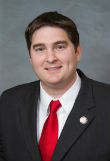RALEIGH — As the N.C.General Assembly passes the halfway mark in the session, environmental organizations are tracking several key bills, including new legislation on stormwater rules, permitting and wind energy and old bills on hydraulic fracking and inlet dredging.
House Bill 480 – the legislature’s latest version of permitting “reform” — sets up a new system for stormwater permits and sedimentation and erosion control plans, mandating that the state Department of Environment and Natural Resources establish minimum design standards that the plans must meet and setting up a fast-track process for issuing permits that meet the new criteria and are developed by engineers certified by the state.
Supporter Spotlight
Streamlining the state’s sometimes cumbersome permitting process is important, noted Todd Miller, executive director of the N.C. Coastal Federation, but so ensuring that the more than 10,000 stormwater permits that have been issued along the coast are adequately and enforced.
“The current coastal stormwater program has many flaws, and something needs to be tried to make it work better,” he said. “The vast majority of the existing stormwater systems that have already been permitted have failed or are falling out of compliance.”
 Rep. Chris Millis |
 Rep. Pat McElraft |
The federation has asked Rep. Chris Millis, R-Pender, one of the bill’s primary sponsors, to add a provision that requires the state to develop a compliance program to ensure that at least 90 percent of permitted stormwater systems are working.
Altering the structure of sediment and stormwater programs has the potential to improve efficiency and protections or to wreck both programs, said Grady McCallie, policy analyst for the N.C. Conservation Network.
“It’s important for legislators to tread thoughtfully in this area,” he said.
Supporter Spotlight
The Senate’s version of the bill, Senate Bill 612, which was recently introduced by Sen. Harry Brown, R-Onslow, contains similar provisions about the minimum design standards and fast-tracking stormwater permits. But it also essentially eliminates buffer rules on the Neuse and Tar-Pamlico rivers by exempting private property. The rules are meant to protect those rivers from nutrient pollution. Brown’s bill also allows an obscure state panel, called the Rules Review Commission, to review any existing state regulation if at least one person objects to the rule. Currently, the panel reviews just new rules.
Brown’s bill also lengthens the renewal time of major permits from 8 to 10 years and bars local government from passing ordinances that are stricter than similar state laws or rules.
Meanwhile, the House has adopted a go-slow approach to legislation passed by the Senate in late February to modify plans adopted in the last session to allow for hydraulic fracking for natural gas in the Piedmont.
Reps. Pat McElraft, R-Carteret and Rick Catlin, R-New Hanover, said they still have serious reservations about language on the use of injection wells for fracking wastewater in Senate Bill 76.
The bill would lift a state ban in place since 1972 on using injection wells for wastewater. Such wells have been a preferred method for industry for disposing of used fracking water. Some hydrologists have said that the coastal plain is the region in the state with geology suitable for deep injection wells. As a result, several local governments on the coast have passed resolutions against that provision in the bill.
McElraft, who chairs the House Environment Committee, said she expects the bill to travel through several House committees and subcommittees to make sure there are adequate safeguards in place. “We’re in no hurry on this,” she said. “We want to make sure injection is being done properly and that it’s not just on us on coast.”
McElraft said there are new technologies for recycling the wastewater that should be looked at as well.
Catlin, a hydrogeologist and environmental engineer who raised the initial concerns about the injection well proposal, said he will fight the plan. “Right now, we’re not rushing through anything,” he said.
He said local governments who have come out against the idea have good reason to be concerned, especially those in the middle portion of the coast where the wells would be most likely to be placed. “It’s not the right thing to do and I’ll do everything I can to stop it,” he said.
Catlin said the House needs to put up a “big speed bump” on the Senate legislation, which he says also has some troubling provisions eliminating consumer protections from potential abuses by landmen.
This Week
 Sen. Harry Brown |
Wind energy: The House Public Utilities and Energy Committee today takes up McElraft’s bill on wind energy generation, which sets up a permitting framework for wind turbines. House Bill 484 requires all facilities generating one megawatt or more to obtain a state permit to operate. Applicants would have to conduct a site evaluation, including potential risks to state natural resources and possible conflicts with state Department of Defense and U.S. Fish and Wildlife rules 120 days before submitting an application. A scoping meeting with local governments, defense representatives and others would be required 30 days ahead of filing a formal application, which then would go through an extensive review process, including public hearings.
Inlet dredging: Also up for committee review this week is a new House bill mandating that the state to work with the Army Corps of Engineers and local governments to develop a long term plan for periodic dredging of shallow draft inlets. House Bill 707 calls for state Department of Environment and National Resources, the Corps and local governments to work out long term agreements for dredging all inlets, the Intracoastal Waterway and Silver Lake in Ocracoke.
The bill gets its first hearing Thursday morning in the House Environment Committee.
The House bill is similar in intent to one that Brown introduced in the Senate, but that bill hit a snag during committee hearings last month after several of his colleagues balked at a hike in boat registration fees proposed as the source for a state match to money from local governments. Boating groups also complained. Brown is reworking his bill, which seeks to create a dedicated funding stream for dredging in the wake of federal cutbacks. He plans to propose smaller increases in registration fees and taking about $2 million from the state’s gas tax that pays for highway improvements. Brown plans to introduce the reworked bill this week.







